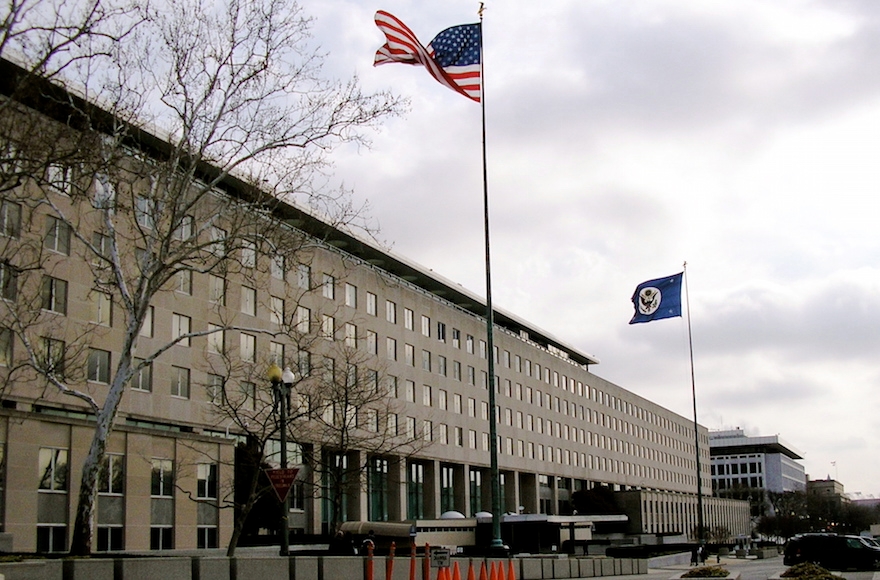WASHINGTON (JTA) — The U.S. State Department’s office to monitor and combat anti-Semitism will be unstaffed as of July 1.
A source familiar with the office’s workings told JTA that its remaining two staffers, each working half-time or less, would be reassigned as of that date.
The Trump administration, which has yet to name an envoy to head the office, would not comment on the staffing change. At full staffing, the office employs a full-time envoy and the equivalent of three full-time staffers.
The State Department told JTA in a statement that it remained committed to combating anti-Semitism – and cited as evidence the tools, including the department’s annual reports on human rights and religious freedom, that existed before Congress mandated the creation of the envoy office in 2004.
“We want to ensure the Department is addressing anti-Semitism in the most effective and efficient method possible and will continue to endeavor to do so,” the statement said.
“The Department of State condemns attacks on Jewish communities and individuals. We consistently urge governments around the world to address and condemn anti-Semitism and work with vulnerable Jewish communities to assess and provide appropriate levels of security.
“The Department, our Embassies, and our Consulates support extensive bilateral, multilateral, and civil society outreach to Jewish communities,” the statement continued. “Additionally, the State Department continues to devote resources towards programs combating anti-Semitism online and off, as well as building NGO coalitions in Europe. We also closely monitor global anti-Semitism and report on it in our Country Reports on Human Rights Practices and International Religious Freedom Report, which document global anti-Semitism in 199 countries.”
Secretary of State Rex Tillerson told Congress in testimony earlier this month that he believed special envoys were counterproductive because they provided an excuse to the rest of the department to ignore the specific issue addressed by the envoy.
Congressional lawmakers from both parties have pressed the Trump administration, in letters and proposed bills, to name an envoy and to enhance the office’s status. They have noted that unlike other envoys, whose positions were created by Trump’s predecessors, the office of the envoy on anti-Semitism is a statute and requires filling.
“As the author of the amendment that created the Special Envoy to Monitor and Combat Anti-Semitism, I remain hopeful that these critical positions will be filled,” Rep. Chris Smith, R-N.J., who authorized the 2004 law, said in a statement to JTA.
Jewish groups have lobbied President Donald Trump to name an envoy, saying that despite Tillerson’s testimony, the position has been key to encouraging diplomats and officials throughout the department to focus on anti-Semitism. Hannah Rosenthal, a special envoy on anti-Semitism in the Obama administration, instituted department-wide training on identifying anti-Semitism.
“The idea of having a dedicated envoy who can travel around the world to raise awareness on this issue is critical,” the Anti-Defamation League CEO, Jonathan Greenblatt, told JTA in an interview.
“That doesn’t mean there isn’t value for all ambassadors and every embassy in addressing issues of anti-Semitism and bigotry in countries they operate,” he said. “But if the administration is truly committed” to combating anti-Semitism, “maintaining the special envoy for anti-Semitism seems like a no-brainer.”
The ADL, coincidentally, launched an online petition Thursday to the White House to fill the position.
Officials of the Simon Wiesenthal Center, which has enjoyed a good relationship with the Trump administration, said that if the unstaffing was coming ahead of a reorganization of the office, that was understandable. But positions remain unfilled in all of the major federal departments and agencies since Trump took office.
“However, we are almost in July and there is still no one of proper rank at the State Department whom the Wiesenthal Center and others can work with to re-activate US leadership in the struggle against anti-Semitism at a time when global anti-Semitism is rising,” said an email from Rabbi Abraham Cooper, the associate dean of the center, and Mark Weitzman, its director of government affairs.
Jason Isaacson, the American Jewish Committee’s director of government and international affairs, said the position was essential.
“It’s not as though the need for a special envoy has diminished,” he told JTA in an interview. “If anything it has increased.”
JTA has documented Jewish history in real-time for over a century. Keep our journalism strong by joining us in supporting independent, award-winning reporting.






